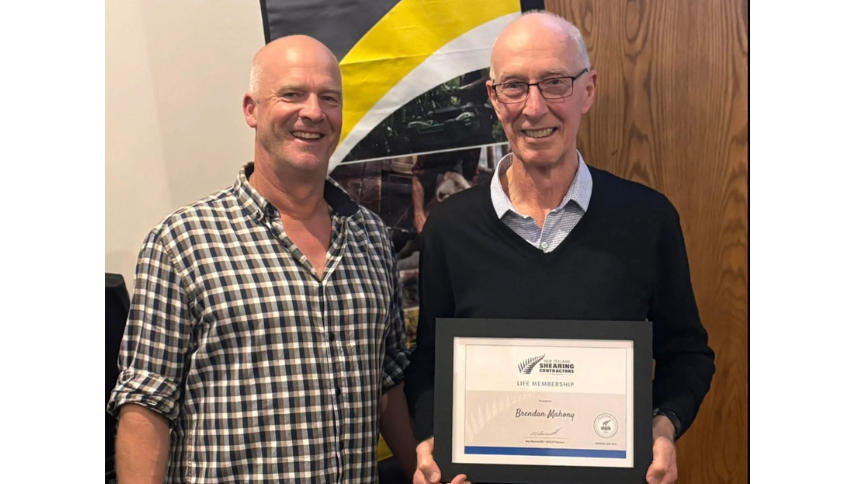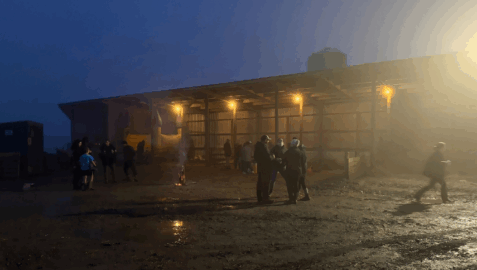
A Lifetime in Shearing
Module Overview
An honest day’s work turned into a 53-year career for Hawkes Bay shearing contractor Brendan Mahony. He was recently made a life member of the NZ Shearing Contractors Association and shared his reflections with Farmstrong.
Congratulations on your award. How did you feel when you found out?
It came as a real surprise. I started contracting in 1972 and over the years the Association has given me a lot of help, so I’ve always been keen to give something back.
Why did you choose a career in shearing?
I sort of fell into it. Left school in 1968 and wanted to be a stock agent but there was a bit of a downturn and they weren’t taking any cadets that year. So I went home and worked on the farm with my parents. When shearing time came around, it must have been a hard year because Dad said ‘Oh, I might share our own sheep.’ So I did a Wool Board course for a week, got my technique down, came home and started shearing. Then a neighbour said he needed a hand and it all just grew from there.
What did you like about shearing?
I soon worked out that the money was a lot better than working on farm or scrub cutting! [laughs]
How did you start your business?
I was just shearing with a few mates and the farm where we were shearing said they were they were getting too busy and were going to hire a contractor and the farmer said, ‘If you want to be the contractor, you can do it.’ I rang an accountant and away we went. It’s funny how life takes these twists and turns and then you look back to see you how got there and realise it was all just by accident!
How have things turned out?
Pretty good. I started as a 22 year-old contractor and we’re still running 53 years later. Nowadays I’ve got a crew of about 18. I need to give some credit to the Association in all this. I could hit the odd 300 sheep a day shearing but I had no real experience running a business. In those days the associations were regional and I got a lot of help from the Manawatu association until it all became one national association.
Was it stressful running a business?
You do take on a lot of responsibility but I wouldn’t be doing it today if I didn’t enjoy it. Like any business there are hard days, but you meet a lot of good people too. I deal with a lot of younger people these days and I’m just happy to give back where I can.
What was the key to the success of your business?
You’ve gotta be honest with everybody, pay your bills and take a longer term view. You don’t always have great days, there’ll be tough spots where you’ve just got to hunker down and recharge to get through, but over the long term, you’ll find you’re making progress.
What did you do you recharge yourself?
I was lucky I still had farmland so I always had that as an outlet. I also had great mates. We’d do a beer every night in the pub on the way home. Like me, they all had their issues at work. It made you realise you weren’t the only one with problems. Sharing the journey like that and having a laugh and a beer makes a big difference.
What’s the key to running a high performing shearing gang?
If you can get a good vibe going and everyone’s on the same page and in a good space, you’re away. That’s where Farmstrong comes in to play. You’re doing a great job there helping people to stay in a good headspace.
People never used to discuss mental wellbeing at all. Do you think attitudes have changed?
I think the Farmstrong messages are filtering through to our industry and to be honest they’re probably more important than ever. It takes a lot of skill, willingness to learn and the right attitude to succeed in shearing. Just because you’ve been wool pressing for two months don’t assume you’re going to be on the handpiece next season. You need to be able to contribute to the team in every way. Although the technology has changed over the years, the attributes and qualities of being a good shearer haven’t. It’s still about an honest day’s work and being a good person to work with.
You’ve also been helping Farmstrong spread the message in your capacity as board chairman of Hawkes Bay rugby, haven’t you?
Yes, we’ve got a game this weekend against Counties Manukau and we’ve invited 60 or 70 farmers from areas that are still getting back on their feet after the cyclones. We’ll provide some food and drinks and they can have some time off farm to recharge and enjoy the game. We’re happy to share Farmstrong messages and resources.
Do you think Farmstrong’s making progress trying to get farmers to prioritise their own wellbeing as well as looking after their land and stock?
I think it’s great that you’ve got Sam Whitelock as the Farmstrong ambassador. He’s a really good person to convey these messages. I really like the idea of Farmstrong being at the top of the cliff instead of an ambulance at the bottom. You’ve done a lot and I think it’s a pity that more farmers don’t use it. Why wait for a crisis to do the things that keep you well?
How do you stay Farmstrong?
I still go for a beer or a coffee with my mates and catch up with what’s going on for them. It really helps to have hobbies and interests outside of work too. I’m lucky I’ve always had rugby. You’re connecting with people, you’re giving back, you’re taking a break. You can’t beat a good day out at the rugby.
Farmstrong is a nationwide, rural wellbeing programme that helps farmers and growers to manage the ups and downs of the industry. Last year more than 15,000 farmers and growers attributed an increase in their wellbeing to the programme. To find out what works for you and lock it in, head to www.farmstrong.co.nz

